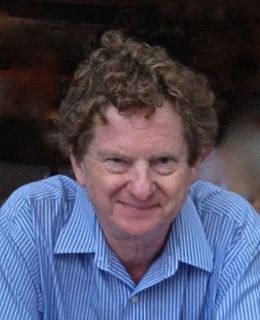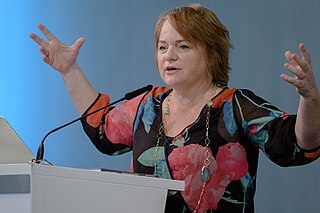Related Research Articles

Manuel Castells Oliván is a Spanish sociologist especially associated with research on the information society, communication and globalization.
Lawrence Oglethorpe Gostin is an American law professor who specializes in public health law. He was a Fulbright Fellow and is best known as the author of the Model State Emergency Health Powers Act and as a significant contributor to journals on medicine and law.

Michael Joseph Shapiro is an American educator, theorist, and writer. He is a Professor of Political Science at the University of Hawaiʻi at Mānoa. His work is often described as "postdisciplinary," drawing from such diverse fields as political philosophy, critical theory, cultural studies, film theory, international relations theory, literary theory, African American studies, comparative politics, geography, sociology, urban planning, economics, psychoanalysis, crime fiction, genre studies, new musicology, aesthetics and indigenous politics.
Jennifer Welsh is a Canadian researcher, writer and consultant, and was the United Nations Secretary-General’s Special Adviser on the Responsibility to Protect (2013-2015).

Hayward R. Alker was a Professor of International Relations at the University of Southern California School of International Relations, the Massachusetts Institute of Technology (MIT), and Yale University. Alker specialized in research methods, core international relations theory, international politics, and security.
Christine L. Borgman is Distinguished Professor and Presidential Chair in Information Studies at UCLA. She is the author of more than 200 publications in the fields of information studies, computer science, and communication. Two of her sole-authored monographs, Scholarship in the Digital Age: Information, Infrastructure, and the Internet and From Gutenberg to the Global Information Infrastructure: Access to Information in a Networked World, have won the Best Information Science Book of the Year award from the American Society for Information Science and Technology. She is a lead investigator for the Center for Embedded Networked Sensing (CENS), a National Science Foundation Science and Technology Center, where she conducts data practices research. She chaired the Task Force on Cyberlearning for the NSF, whose report, Fostering Learning in the Networked World, was released in July, 2008. Prof. Borgman is a Fellow of the American Association for the Advancement of Science (AAAS), a Legacy Laureate of the University of Pittsburgh, and is the 2011 recipient of the Paul Evan Peters Award from the Coalition for Networked Information, Association for Research Libraries, and EDUCAUSE. The award recognizes notable, lasting achievements in the creation and innovative use of information resources and services that advance scholarship and intellectual productivity through communication networks. She is also the 2011 recipient of the Research in Information Science Award from the American Association of Information Science and Technology. In 2013 she became a fellow of the Association for Computing Machinery.

John James Kirton is a professor of political science and the director and co-founder of the G7 Research Group, co-director and founder of the G20 Research Group, founder and co-director of the Global Health Diplomacy Program, and founder and co-founder of the BRICS Research Group, all housed at the Munk School of Global Affairs at University of Trinity College in the University of Toronto. Since 2016, he has served as interim director of the International Relations Program at Trinity College in the University of Toronto.

Kalypso Aude Nicolaïdis is a Greek / French academic, currently Professor of International Relations and Director of the Center for International Studies at Oxford University, England. She teaches in the areas of European integration, international relations, international political economy, negotiation and game theory and research methods as University Lecturer in the Department of Politics and International Relations.

Laura DeNardis is an American author and a globally recognized scholar of Internet governance and technical infrastructure. She is a tenured Professor and the Interim Dean in the School of Communication at American University. DeNardis is an affiliated Fellow of the Yale Information Society Project at Yale Law School and served as its Executive Director from 2008-2011. She previously served as a Senior Fellow of the Centre for International Governance Innovation (CIGI) and the Director of Research for the Global Commission on Internet Governance. With a background in information technology engineering and a doctorate in Science and Technology Studies (STS), her research studies the social and political implications of Internet technical architecture and governance. Domestically, she served as an appointed member of the U.S. Department of State Advisory Committee on International Communications and Information Policy (ACICIP) during the Obama Administration. She has more than two decades of experience as an expert consultant in Internet Governance to Fortune 500 companies, foundations, and government agencies.

David Lyon is a Scottish sociologist who directs the Surveillance Studies Centre, holds a Queen's Research Chair and is cross-appointed as a Professor in the Faculty of Law at Queen's University in Kingston, Ontario.

Jennifer Sterling-Folker is the Alan R. Bennett Honors Professor of Political Science at the University of Connecticut. She is a specialist in International Relations theory.

Benjamin K. Sovacool is an American academic who is director of the Danish Center for Energy Technology at the Department of Business Technology and Development and a professor of social sciences at Aarhus University. He is also professor of energy policy at the University of Sussex, where he directs the Center on Innovation and Energy Demand and the Sussex Energy Group. He has written on energy policy, environmental issues, and science and technology policy. Sovacool is editor-in-chief of Energy Research & Social Science.
Daniel Drache is a scholar in Canadian and international political economy, globalization studies, communication studies, and cultural studies. He is recognized as having made important contributions to comparative and interdisciplinary debates on policy, globalization, border security, and the impact of new information and communication technologies on political mobilization and citizenship. He is also known for his critique of market fundamentalism. In Canada he is also credited with reviving the work of foundational political economist Harold Innis within the academy. Drache is a professor emeritus political science and senior research scholar of the Robarts Centre for Canadian Studies at York University in Toronto, Canada.
Shirin M. Rai, is a political scientist, known for her research on the intersections between globalisation, post-colonial governance, processes of democratisation and gender regimes. She is the Director of the Gendered Ceremony and Ritual in Parliament Programme, a four-year interdisciplinary project funded by the Leverhulme Trust that studies the performances of ritual, ceremony, symbolism and affect in the British, Indian and South African parliaments.
Mary Hawkesworth is Distinguished Professor of Political Science and Women's and Gender Studies at Rutgers University in New Jersey. She is a political scientist trained in feminist theory and has conducted extensive research in women and politics, gender, and contemporary feminist activism. Hawkesworth was previously the Editor-in-Chief of Signs: Journal of Women in Culture and Society, an internationally recognized journal in feminist scholarship.
Chantal J.M. Thomas, Cornell Law Professor at Cornell Law School, directs the Clarke Initiative for Law and Development in the Middle East and North Africa. Thomas teaches in the areas of Law and Development, Law and Globalization, and International Economic Law and is active in the areas of human rights and social justice, particularly in the Middle East.

Dana R. Fisher is an American sociologist, professor of sociology, and public speaker and author. Her most recent book is American Resistance: from the Women’s March to the Blue Wave (2019). She is a professor at the University of Maryland who speaks and writes about activism, democracy and environmental policy.
Richard K. Ashley is a postmodernist scholar of International relations. He is an associate professor at the Arizona State University's School of Politics and Global Studies.

Anriette Esterhuysen is a human rights defender and computer networking pioneer from South Africa. She has pioneered the use of Internet and Communications Technologies (ICTs) to promote social justice in South Africa and throughout the world, focusing on affordable internet access. She has been the Executive Director of the Association for Progressive Communications since 2000 until April 2017, when she became APC's Director of Policy and Strategy. In November 2019 United Nations Secretary-General António Guterres appointed Anriette Esterhuysen as the new Chair of the Internet Governance Forum’s Multistakeholder Advisory Group.
Diane L. Stone is an Australian-British academic.